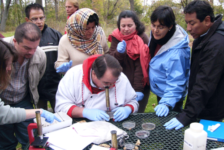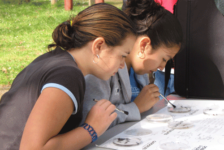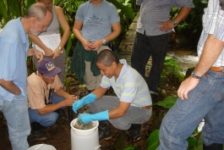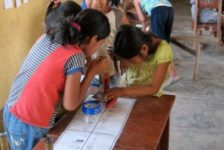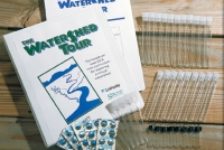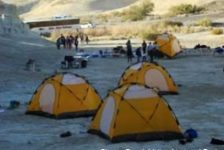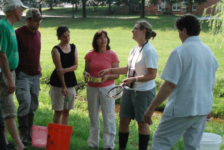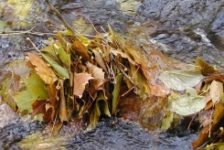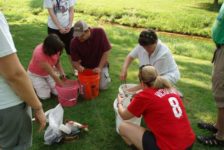In this issue: First Leaf Pack Workshop in Costa Rica; Macroinvertebrate Review: Blackflies vs. Midges; Leaf Pack Workshop: the Guatemalan Experience.
“There is ever a lurking suspicion that the beginning of things is in some way associated with water …” — John Burroughs.
First Leaf Pack Workshop in Costa Rica
By Cheryl Baduini, Ph.D., Associate Professor of Biology, The Claremont Colleges
Community members in southwestern Costa Rica participated in a workshop to engage elementary schools and conservation professionals in local stream investigations.
Much of Costa Rica comprises small towns and communities that do not have organized municipal governments to oversee water provision. In these rural communities of southwestern Costa Rica, about one in five people obtain their household water directly from local streams. Thus, engaging young members of the community in stream investigations has direct applications to their everyday lives — healthier streams means better water for drinking and for use in their homes.
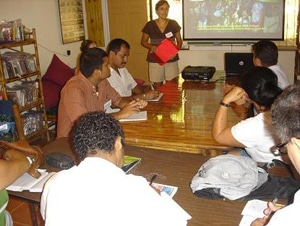
This workshop, held at the Firestone Center for Restoration Ecology at Pitzer College, in Dominical, C. R., was a direct outgrowth of the Leaf Pack Ambassador program, initiated by the Stroud Water Research Center, which promotes community involvement in the assessment of stream water quality in Latin American countries. Conducted in Spanish, the first language of most of the participants, the workshop was led by Program Director, Isabel Arguello-Chaves and by Professor Cheryl Baduini, both of whom are Leaf Pack Ambassadors.
In attendance were representatives from the Ministry of the Environment of Costa Rica, Asociacion de Amigos de La Naturaleza, the superintendent from the Region 4 South School District, teachers from elementary schools in the towns of Platanillo, Baru, Dominical, and Ballena. Participants actively engaged in discussion about coordinating student participation in Leaf Pack experiments and its use as a teaching tool for water conservation and stream restoration.
For more information on the Leaf Pack Ambassador program please visit Stroud Water Research Center’s website.
Macroinvertebrate Review: Blackflies vs. Midges
A quick review of commonly misidentified macroinvertebrates. This time we look at the differences between blackflies and midges, which are often mistaken for each other.
Common Characteristics
- Worm-like body
- Head and/or fleshy protrusions
- Distinct head
How They Differ
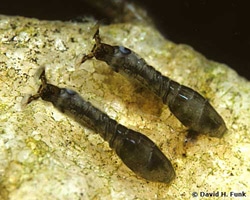
Blackflies have one end wider than the other (almost looks like a bowling pin)
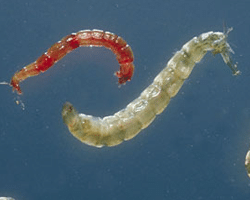
Midges have similar widths on both ends of their body
Leaf Pack Workshop: the Guatemalan Experience
By Nancy Girón & Cristina Bailey from Rafael Landivar University, Guatemala City
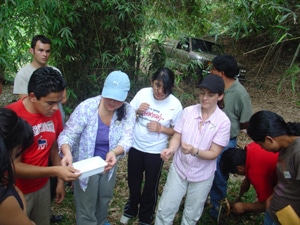
Earlier this year, Rafael Landivar University and the Guatemalan Natural Private Reserves Association (ARNPG) developed a partnership in order to promote research in these protected areas by college students, teachers and researchers.
To celebrate this partnership we organized a workshop this past May titled, “The importance of aquatic life in stream water quality.” Los Tarrales Reserve located in San Lucas Tolimán, in the southern watershed of Lake Atitlán, was our workshop location which hosted ARNPG members, elementary school teachers, municipality representatives and students from the Environmental Management career.
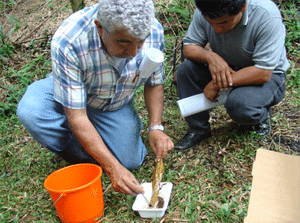
During the initial presentation, the participants were very attentive and showed their interest asking questions about relevant subjects, such as the relation between water conservation and forests, and how macroinvertebrates worked as water quality indicators. We noticed how participants showed curiosity while watching the organisms under the lenses and were very enthusiastic while classifying them in different groups.
School principals and owners of protected lands showed interest in further training regarding this methodology. They see the need for this kind of training in the region and they would like to promote it among their peers and partners. They suggested that a similar workshop should be planned for other ecoregions.
We think this could be a great step toward establishing a Guatemalan network and to share this information through the Leaf Pack Network®.



